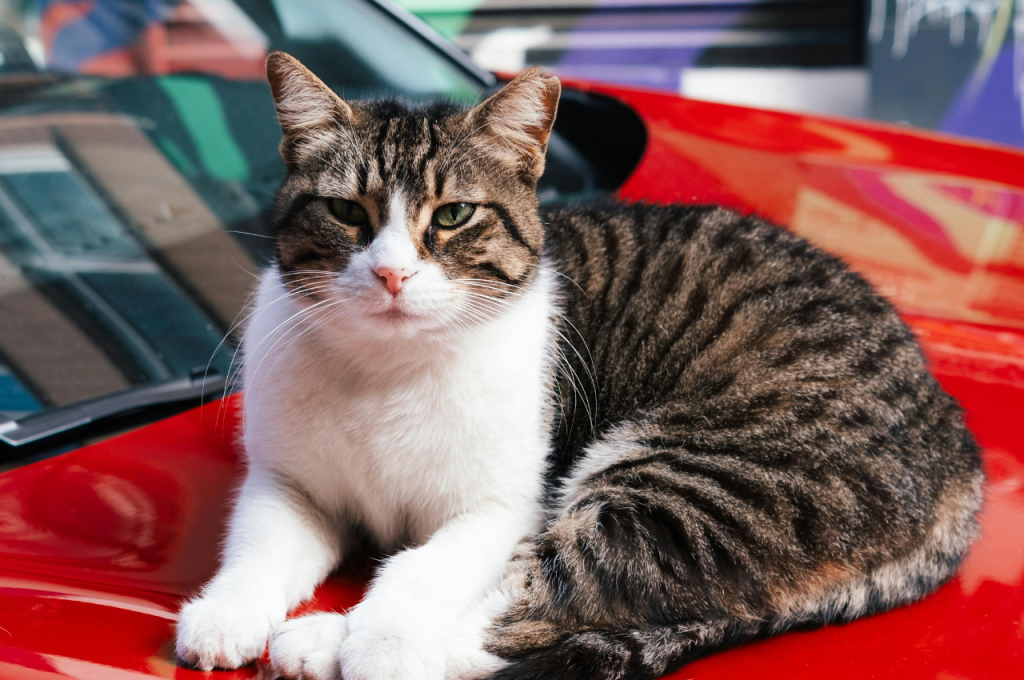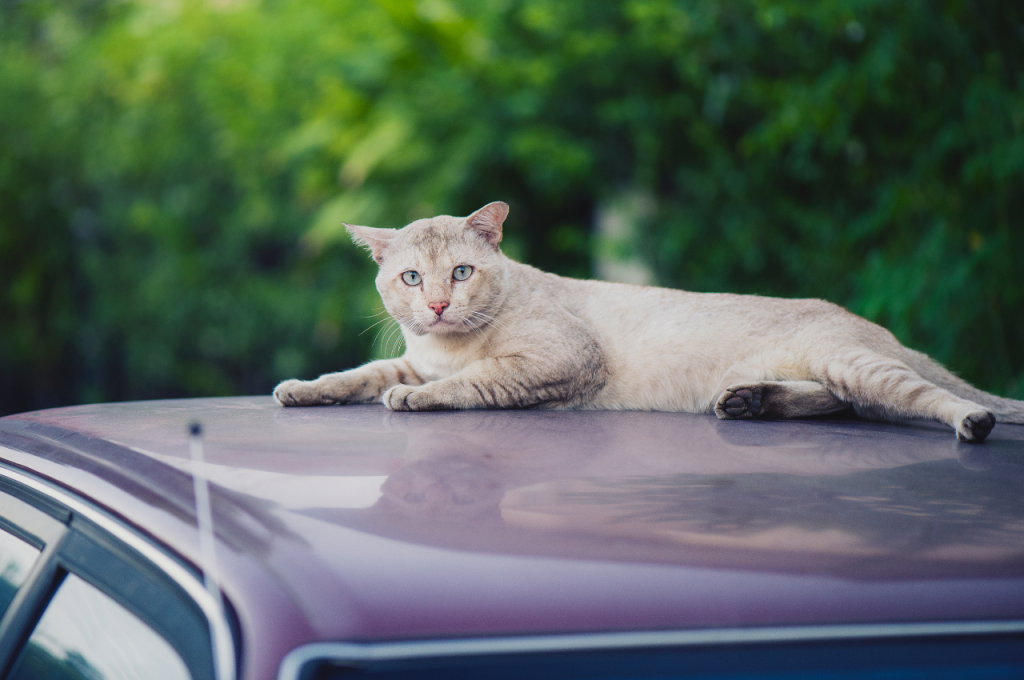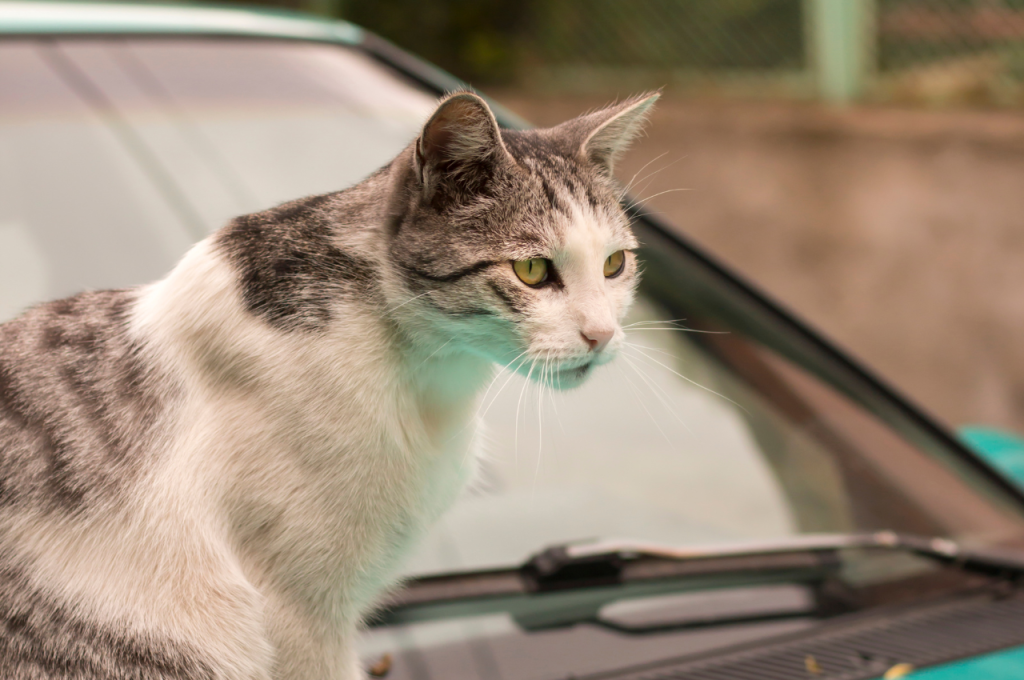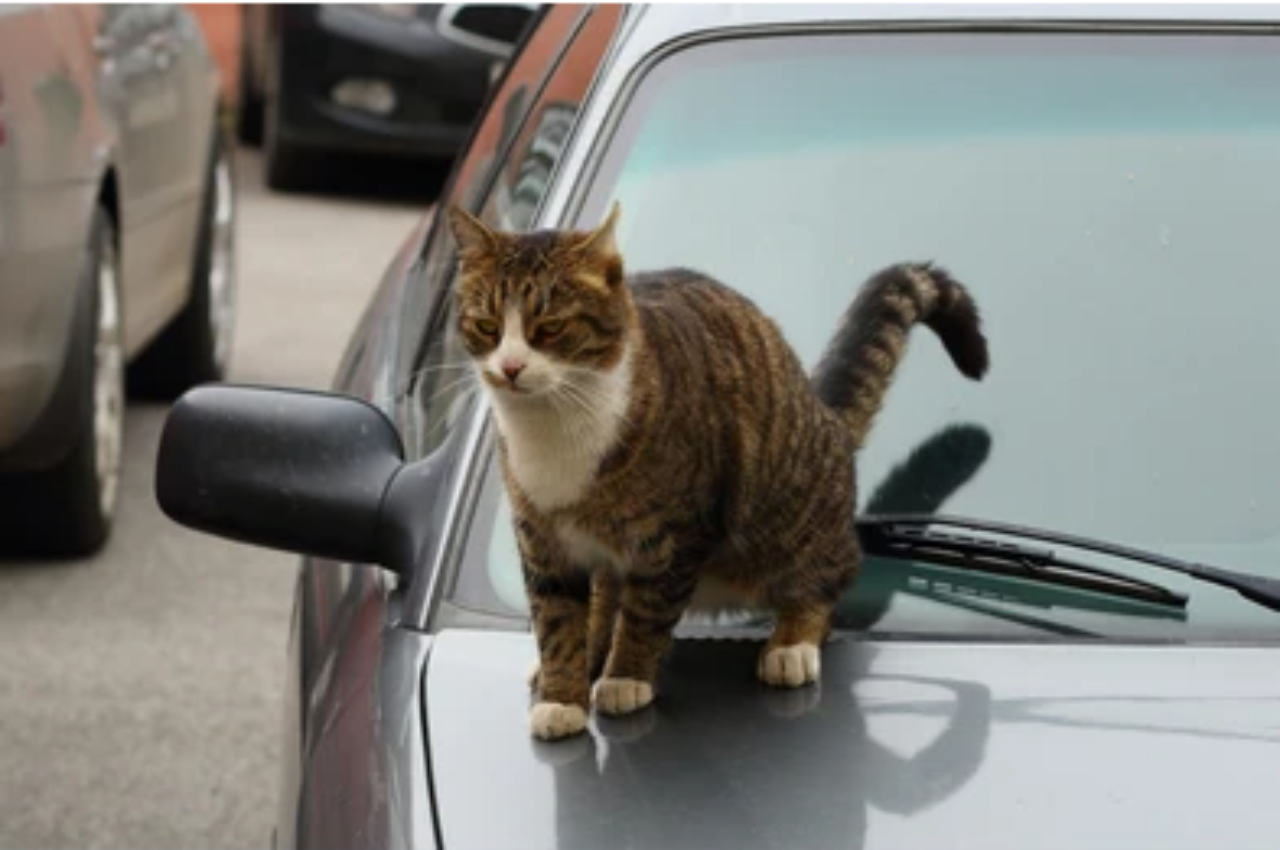Dealing with cats peeing on your car can be a frustrating and persistent problem for many vehicle owners. Whether it’s stray cats or neighborhood pets, this behavior can leave your car dirty and smelly. Understanding why cats do this and knowing how to effectively deter them is key to keeping your vehicle clean.
In this blog, we’ll explore proven solutions to stop cats from marking your car, from using natural repellents to implementing simple changes in your parking area. With these tips, you can protect your car and maintain a clean, odor-free vehicle.
Understanding The Behavior of Cats
Cats can be mysterious creatures, and their behavior often leaves us puzzled. When dealing with the issue of cats peeing on your car, it’s important to understand their behavior patterns. By gaining insight into the reasons behind this behavior, you can take appropriate steps to address the problem effectively.

The Urge to Mark Territory
Cats are territorial animals by nature. They use urine to mark their territory and communicate with other cats. This behavior is particularly common in outdoor or stray cats. When they perceive your car as a part of their territory, they may instinctively mark it with their urine. Understanding this primal urge to mark territory is crucial in finding a solution.
Impact of Stress and Anxiety
Cats can experience stress and anxiety for various reasons, and one way they may express such feelings is by urinating in inappropriate places, such as on cars. Changes in the household, conflicts with other pets, or even loud noises can trigger stress in cats. By recognizing the impact of stress and anxiety on their behavior, you can take steps to create a more calming environment and reduce their desire to mark their territory on your car.
Identifying the Problem Areas
If you’ve ever fallen victim to cats using your car as their personal toilet, you know how frustrating it can be. Not only does it create an unpleasant smell, but it can also damage the exterior of your vehicle. To put an end to this pesky problem, the first step is identifying the problem areas where cats are likely to target.
By understanding their preferences and behaviors, you can take proactive measures to deter them from marking your car. Let’s explore the common target spots and signs of marking behavior to help you get to the root of the issue.
Common Target Spots
Cats are known for being meticulous creatures, and when it comes to marking their territory, they have specific preferences. By identifying the common target spots, you can focus your efforts on protecting these areas of your vehicle.
| Target Spots | Reasons |
| Wheel Wells | The shelter and protection provided by the wheel wells make them an enticing spot for cats to mark. |
| Tires | Cats are attracted to the smells and textures of tires, making them an ideal place to leave their mark. |
| Hood | The hood of a car is a common target spot as it provides a large, flat surface for cats to urinate on. |
| Trunk | Similar to the hood, cats may choose to mark the trunk of a car due to its broad area. |
By focusing on these common target spots, you can take proactive steps to protect your vehicle and discourage cats from using them as their personal bathroom.
Signs of Marking Behavior
To effectively address the issue of cats urinating on your car, it’s crucial to be able to recognize the signs of marking behavior. By identifying these signs early on, you can take swift action to prevent further incidents.
- Strong Odor: If you notice a pungent smell around your car, it could be a sign that cats are marking their territory.
- Visible Spray Marks: Look for visible signs of cat urine spray, such as discolored patches or streaks on your car’s exterior.
- Repeat Offenses: If you consistently find evidence of cat urine on your car, it’s a clear indication of marking behavior.
- Presence of Other Cats: If there are other cats in your neighborhood, their presence can trigger marking behavior in your car.
Being vigilant and recognizing these signs will help you address the problem promptly, ensuring your car remains urine-free.
Implementing Deterrents
Implementing deterrents effectively can significantly reduce the likelihood of undesirable behavior by introducing consequences that outweigh the perceived benefits of such actions.
Natural Repellents
Cats dislike strong scents like citrus, peppermint, or lavender. Plant lavender or scatter orange peels near your car to deter them.
Physical Barriers
Use motion-activated sprinklers or aluminum foil on your car’s surface.
Creating A Positive Environment
Prevent cats from peeing on your car by creating a positive environment with these effective tips. Maintain cleanliness, use repellent sprays, and provide a comfortable space for your feline friends to deter them from marking your vehicle.

Providing Alternative Territory Marking Options
Offer scratching posts or trees near your car to redirect the marking behavior. Use pheromone products to create a comforting environment.
Reducing Stress Factors
Limit exposure to loud noises. Ensure a predictable routine for feeding and playtime.
Cleaning and Neutralizing Odor
Cleaning and neutralizing odor are essential steps in stopping cats from peeing on your car. By properly removing the scent markers left behind, you can discourage cats from returning to the same spot.
Effective Cleaning Products
When choosing cleaning products to eliminate cat urine, opt for enzymatic cleaners specially formulated to break down the odor-causing compounds.
- Enzymatic Cleaners: Breaks down urine molecules effectively.
- Baking Soda: Helps absorb odors and neutralize the smell.
- Vinegar Solution: Diluted vinegar can be a natural and effective odor remover.
Seeking Professional Help
If you’re dealing with the frustrating issue of cats urinating on your car, seeking help from a professional could provide an effective solution. Professional experts specializing in animal behavior and pest control can offer tailored advice and practical strategies to deter feline activity, safeguarding your vehicle from further damage.
Consulting A Veterinarian
If you have tried various methods to stop cats from peeing on your car and nothing seems to be working, it may be time to seek professional help. One of the first experts you should consider consulting is a veterinarian.
A veterinarian can help determine if there is an underlying medical issue causing your cat to urinate on your car. Sometimes, cats may have urinary tract infections or other health problems that cause them to have accidents outside of the litter box.
By consulting a veterinarian, you can rule out any medical issues and ensure that your cat is in good health. They may also be able to provide advice or prescribe medication to help modify your cat’s behavior.
Behavioral Specialist Assistance
If your cat is physically healthy and there are no underlying medical issues, it may be beneficial to seek assistance from a behavioral specialist. A behavioral specialist is an expert who can help identify and address the root cause of your cat’s inappropriate urination.
These specialists have in-depth knowledge of feline behavior and can work with you to develop a customized plan to deter your cat from peeing on your car. They will observe and analyze your cat’s behavior, identify any triggers or stressors, and provide you with strategies to modify your cat’s behavior in a humane and effective manner.
Behavioral modification techniques might include creating a positive litter box environment, implementing changes to your cat’s routine or environment, or using pheromone therapy to help reduce stress and anxiety.
If you are struggling to stop your cat from peeing on your car, consulting a veterinarian or behavioral specialist may be the key to finding a solution. They have the knowledge and expertise to diagnose any potential medical issues and help address behavioral problems in a safe and effective manner.
Monitoring and Consistency
When it comes to solving the frustrating problem of cats peeing on your car, monitoring and consistency are key elements that can make a significant difference. It’s important to regularly inspect and maintain your car, as well as consistently implement solutions to deter cats from urinating on it.
Regular Inspection and Maintenance
Regularly inspecting and maintaining your car can help identify potential areas where cats are urinating. Here are a few simple maintenance practices that can deter cats:
- Keep the car clean: Regularly clean the exterior of your car to remove any scent that might attract cats.
- Check for leaks: Inspect your vehicle for any leaks that might be attracting cats due to the smell of antifreeze or other fluids.
- Use deterrents: Consider using cat deterrents such as motion-activated sprinklers or ultrasonic devices to keep cats away from your car.
Consistent Implementation of Solutions
Consistency is crucial when it comes to implementing solutions to prevent cats from urinating on your car. Here are some consistent strategies to deter cats:
- Establish a routine: Implement a daily or weekly routine to clean and maintain your car to discourage cats from marking their territory.
- Use repellents: Apply commercial cat repellents to the areas where cats tend to urinate, and reapply them consistently to maintain their effectiveness.
- Provide an alternative: Consider providing a designated area for cats to relieve themselves, such as a sandbox or designated spot in your yard.
Conclusion and Long-term Maintenance
With the valuable information provided in this blog post, you now have the tools and knowledge necessary to put an end to the frustrating issue of cats peeing on your car. By implementing preventive measures and focusing on long-term maintenance, you can create a cat-free environment and enjoy a clean and odor-free vehicle.
Celebrating Progress
Before we delve into the long-term preventive measures, let’s take a moment to celebrate the progress you’ve made so far. It’s essential to acknowledge your efforts in deterring cats from your car and recognize the positive changes you’ve achieved.

Remember, consistency is key when dealing with cats. Even if you have successfully discouraged them from peeing on your vehicle for a few days, continue to follow the preventive methods to maintain these positive results.
Long-term Preventive Measures
For a more permanent solution, implement these long-term preventive measures to ensure your car remains a cat-free zone:
- Secure Garaging: If possible, keep your car in a secure garage or carport. Cats are less likely to venture into enclosed spaces.
- Physical Barriers: Install motion-activated sprinklers or ultrasonic repellents in your driveway or near the parking area to deter cats from approaching your vehicle.
- Use Citrus Scents: Cats dislike the smell of citrus. Consider placing orange or lemon peels around your car or using citrus-scented sprays as a natural deterrent. Replace the peels or reapply the spray regularly to maintain their effectiveness.
- Cover Your Car: Use a car cover specifically designed to prevent cats from gaining access to your vehicle. Ensure it is securely attached to prevent cats from getting underneath.
- Develop a Routine: Create a routine that involves checking your car and its surroundings regularly for any signs of cat activity. Identifying and addressing potential issues promptly can prevent future incidents.
By incorporating these long-term preventive measures into your routine, you can significantly reduce the likelihood of cats peeing on your car. Consistency and regular maintenance are key factors in ensuring your vehicle remains free from unwanted feline visitors.
Remember, patience is key when dealing with this issue. Implementing a combination of preventive methods and consistently maintaining a cat-free environment will ultimately lead to lasting success.
Conclusion
To effectively prevent cats from peeing on your car, it’s crucial to address their underlying motivations. By implementing strategies like using deterrent sprays, employing visual barriers, providing alternative litter spots, and seeking veterinary assistance if necessary, you can effectively resolve this issue.
With a proactive approach, you can ensure your car remains scent-marking free, allowing you to enjoy a clean and odor-free vehicle once again. Don’t let cat urine ruin your car, take action today!
